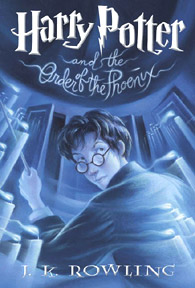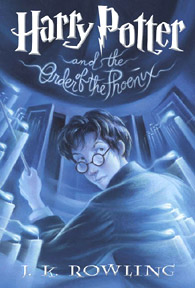Harry Potter - the world's favourite wizard boy - is a gay icon, claims gay American social commentator and writer Michael Bronski in his column in The Boston Phoenix. He asserts that the life of the wizard boy mirrors the traditional coming-out story and his magical powers have made him an outcast in his own family in the same way gays and lesbians often feel.

He also claims that throughout the story, in which Harry is confused by his secret desires and is forced to live in a cupboard - or closet - to deny who he really is; author JK Rowling's language and story details "lend themselves effortlessly" to a gay reading of the best-selling series.
Bronski who acknowledges that any good novels may have any number of readings, he is certain that the 'gay reading of Harry Potter is there'.
"In the early chapters there is a constant reminder that Harry should not bring his 'abnormality' into the Dursleys' house. All of the language - that the Dursleys are normal and that they never mention the M-word - very much lends itself to actual society, where there is still a strong feeling that the G-word or the H-word should not be mentioned.
"I related very heavily to those early chapters in the first book. It struck me in the first few pages that here was a revolt against accepted, conventional life. A lot of gay people I know read the books that way, and it really mirrors their own experiences of discovering who they really are. They can relate to moving into this other world - the Muggle world - but also to being separate from it."
Bronski added that Rowling, in her latest book, The Order Of The Phoenix, seems to "play more openly" with a gay reading. In one section, Harry's cousin Dudley mentions that the wizard spoke in his sleep about someone named Cedric and blasts: "Who's Cedric? Your boyfriend?"
In another section, a house owl scolds Harry by warning him to put his wand back in his pants after Harry producing a full-formed corporeal creature (a Patronus) from his wand, instead of just 'vapour and smoke' - thus hinting at the boy's maturity.
The author of a number of books including Culture Clash: The Making Of Gay Sensibility added: "Even more intriguing, from a queer perspective, is how Rowling has structured the double world in the Potter books. In gay life, there is a separation between gay culture and mainstream culture, just as there is between magical culture and Muggle culture in the books.

While Harry Potter has acquired many new fans in the past four years, a growing number of evangelical Christian groups have launched a campaign to have the books banned because, they argue, glorify sorcery, celebrate the occult and encourage witchcraft.
Some Christian-linked schools in the US and the UK have banned the Potter books saying that the Bible condemns witches and wizards as evil, while the books portray them as fun and harmless.
A teacher told the Sunday Times: "Our ethos on teaching comes from the Bible. The Bible is clear about issues such as witchcraft, demons, devils and the occult. It says clearly and consistently from Genesis to Revelation that they are real, powerful and dangerous. Throughout it insists that God's people should have nothing to do with them."
"The Christian right just might be, at least partly, right," said Bronski.
"The Harry Potter books are a threat to accepted ideas about the social welfare and mental health of children. Not because they romanticise witchcraft and wizardry, but because they are deeply subversive in their unremitting attacks on the received wisdom that being 'normal' is good, reasonable or even healthy."
A spokeswoman for JK Rowland refused to comment but a source close to the author said she was "astonished" at Bronski's claims, reports the Mirror.











 Printable Version
Printable Version










Reader's Comments
Be the first to leave a comment on this page!
Please log in to use this feature.